Legal System for Business Law
VerifiedAdded on 2023/06/17
|10
|2718
|220
AI Summary
This report discusses the legal system for business law in the UK, including the classification of law, source of law, and employment law. It covers the role of different courts, case law as a source of law, and the process of legislation making. It also explains the statutory duties of employers towards employees and actions against wrongful dismissal. Subject: Business Law, Course Code: N/A, Course Name: N/A, College/University: N/A
Contribute Materials
Your contribution can guide someone’s learning journey. Share your
documents today.
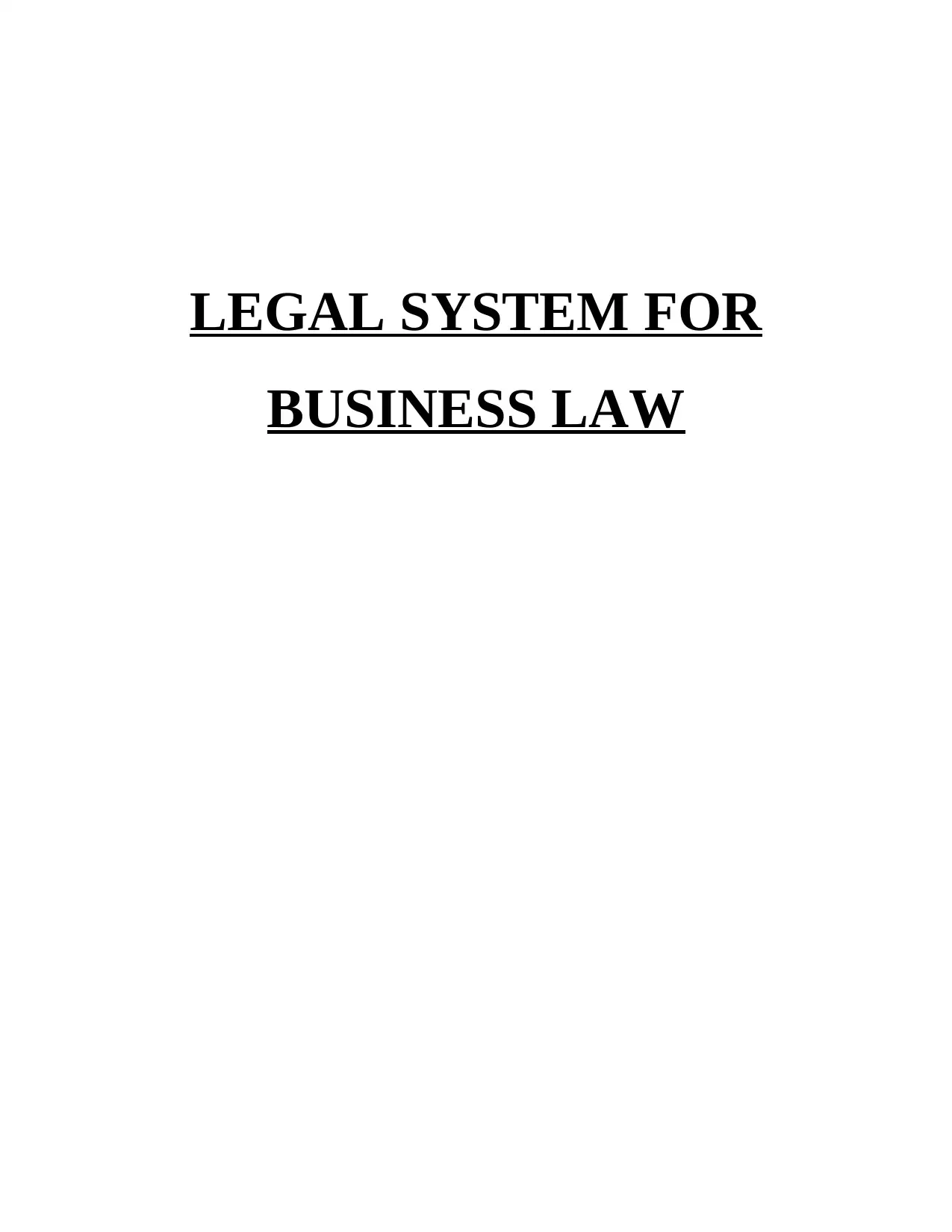
LEGAL SYSTEM FOR
BUSINESS LAW
BUSINESS LAW
Secure Best Marks with AI Grader
Need help grading? Try our AI Grader for instant feedback on your assignments.
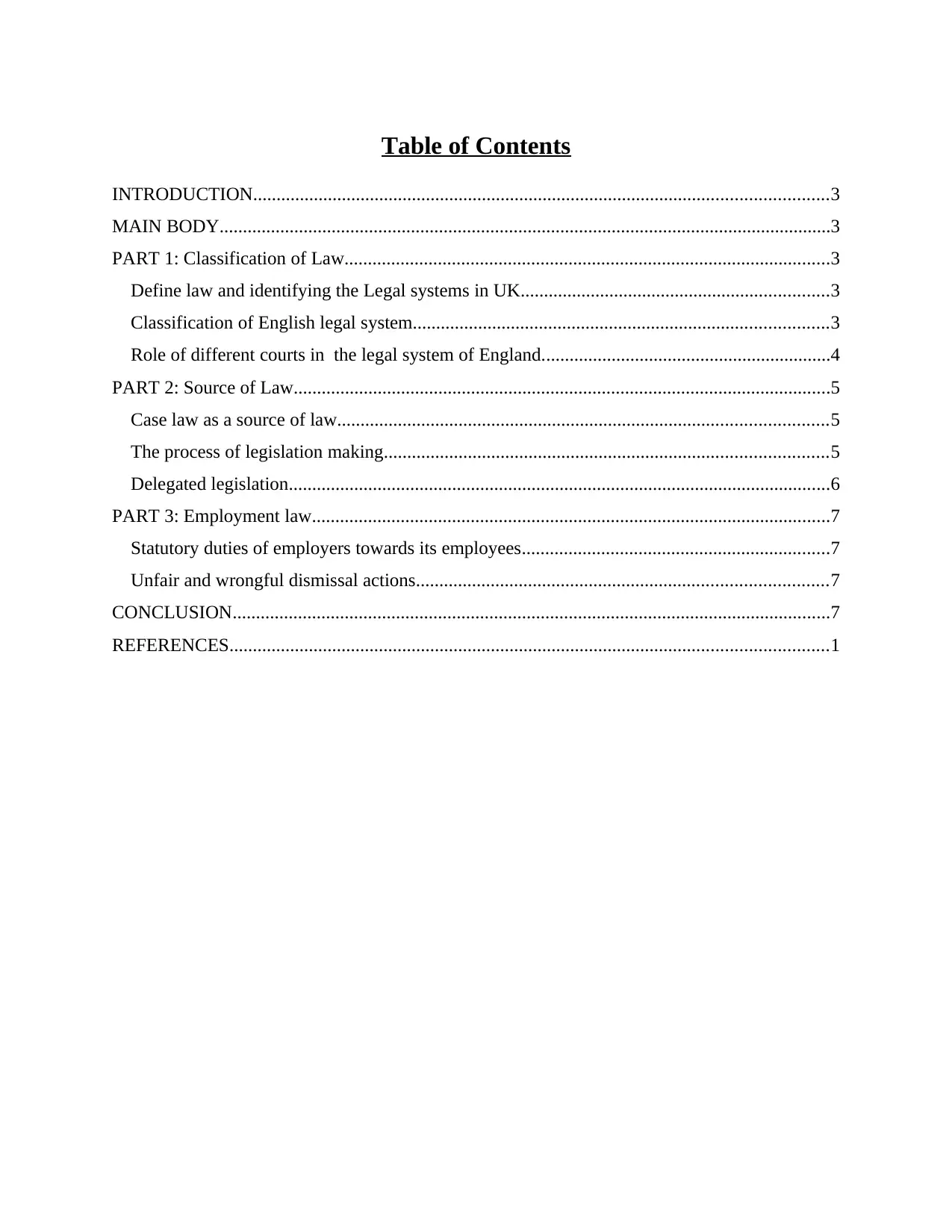
Table of Contents
INTRODUCTION...........................................................................................................................3
MAIN BODY...................................................................................................................................3
PART 1: Classification of Law........................................................................................................3
Define law and identifying the Legal systems in UK..................................................................3
Classification of English legal system.........................................................................................3
Role of different courts in the legal system of England..............................................................4
PART 2: Source of Law...................................................................................................................5
Case law as a source of law.........................................................................................................5
The process of legislation making...............................................................................................5
Delegated legislation....................................................................................................................6
PART 3: Employment law...............................................................................................................7
Statutory duties of employers towards its employees..................................................................7
Unfair and wrongful dismissal actions........................................................................................7
CONCLUSION................................................................................................................................7
REFERENCES................................................................................................................................1
INTRODUCTION...........................................................................................................................3
MAIN BODY...................................................................................................................................3
PART 1: Classification of Law........................................................................................................3
Define law and identifying the Legal systems in UK..................................................................3
Classification of English legal system.........................................................................................3
Role of different courts in the legal system of England..............................................................4
PART 2: Source of Law...................................................................................................................5
Case law as a source of law.........................................................................................................5
The process of legislation making...............................................................................................5
Delegated legislation....................................................................................................................6
PART 3: Employment law...............................................................................................................7
Statutory duties of employers towards its employees..................................................................7
Unfair and wrongful dismissal actions........................................................................................7
CONCLUSION................................................................................................................................7
REFERENCES................................................................................................................................1
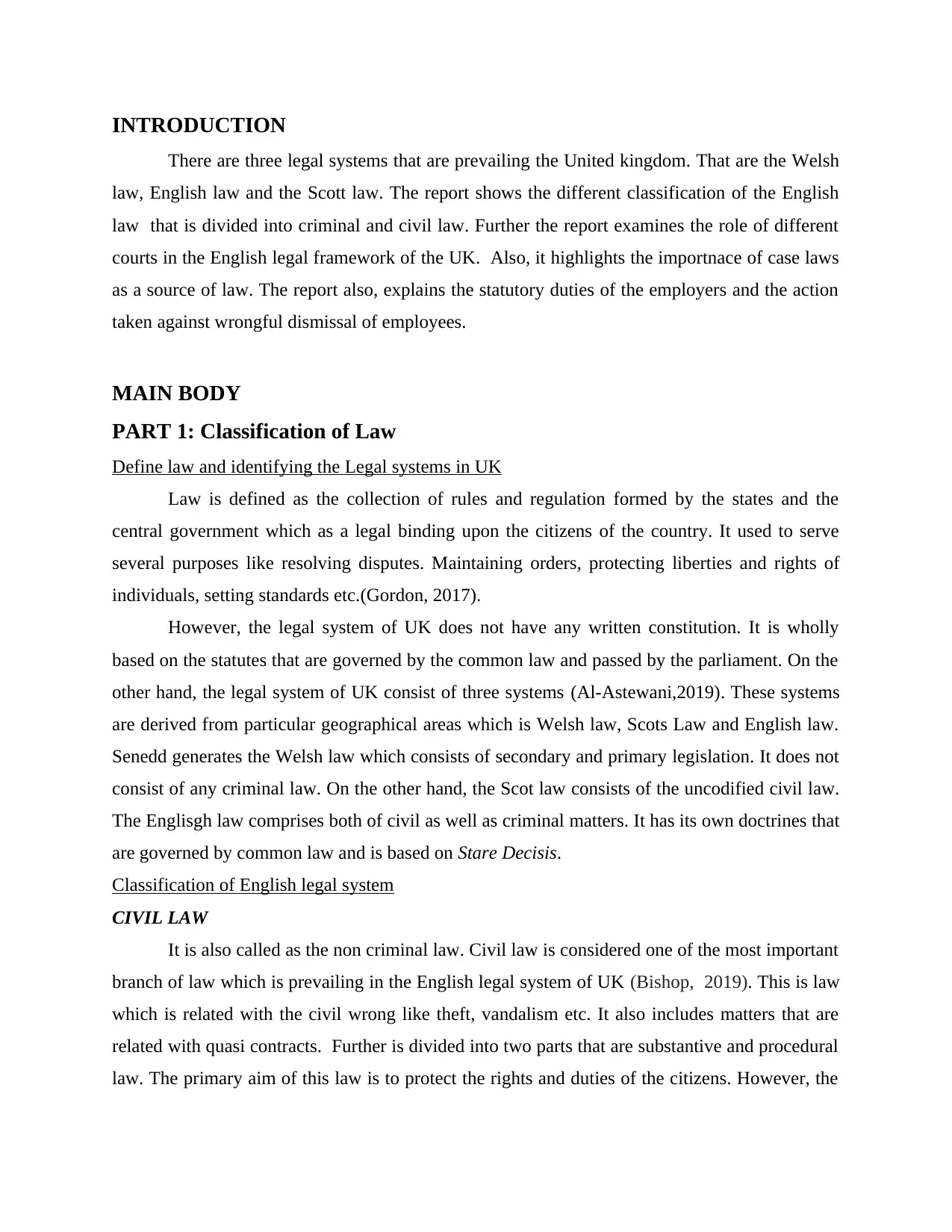
INTRODUCTION
There are three legal systems that are prevailing the United kingdom. That are the Welsh
law, English law and the Scott law. The report shows the different classification of the English
law that is divided into criminal and civil law. Further the report examines the role of different
courts in the English legal framework of the UK. Also, it highlights the importnace of case laws
as a source of law. The report also, explains the statutory duties of the employers and the action
taken against wrongful dismissal of employees.
MAIN BODY
PART 1: Classification of Law
Define law and identifying the Legal systems in UK
Law is defined as the collection of rules and regulation formed by the states and the
central government which as a legal binding upon the citizens of the country. It used to serve
several purposes like resolving disputes. Maintaining orders, protecting liberties and rights of
individuals, setting standards etc.(Gordon, 2017).
However, the legal system of UK does not have any written constitution. It is wholly
based on the statutes that are governed by the common law and passed by the parliament. On the
other hand, the legal system of UK consist of three systems (Al-Astewani,2019). These systems
are derived from particular geographical areas which is Welsh law, Scots Law and English law.
Senedd generates the Welsh law which consists of secondary and primary legislation. It does not
consist of any criminal law. On the other hand, the Scot law consists of the uncodified civil law.
The Englisgh law comprises both of civil as well as criminal matters. It has its own doctrines that
are governed by common law and is based on Stare Decisis.
Classification of English legal system
CIVIL LAW
It is also called as the non criminal law. Civil law is considered one of the most important
branch of law which is prevailing in the English legal system of UK (Bishop, 2019). This is law
which is related with the civil wrong like theft, vandalism etc. It also includes matters that are
related with quasi contracts. Further is divided into two parts that are substantive and procedural
law. The primary aim of this law is to protect the rights and duties of the citizens. However, the
There are three legal systems that are prevailing the United kingdom. That are the Welsh
law, English law and the Scott law. The report shows the different classification of the English
law that is divided into criminal and civil law. Further the report examines the role of different
courts in the English legal framework of the UK. Also, it highlights the importnace of case laws
as a source of law. The report also, explains the statutory duties of the employers and the action
taken against wrongful dismissal of employees.
MAIN BODY
PART 1: Classification of Law
Define law and identifying the Legal systems in UK
Law is defined as the collection of rules and regulation formed by the states and the
central government which as a legal binding upon the citizens of the country. It used to serve
several purposes like resolving disputes. Maintaining orders, protecting liberties and rights of
individuals, setting standards etc.(Gordon, 2017).
However, the legal system of UK does not have any written constitution. It is wholly
based on the statutes that are governed by the common law and passed by the parliament. On the
other hand, the legal system of UK consist of three systems (Al-Astewani,2019). These systems
are derived from particular geographical areas which is Welsh law, Scots Law and English law.
Senedd generates the Welsh law which consists of secondary and primary legislation. It does not
consist of any criminal law. On the other hand, the Scot law consists of the uncodified civil law.
The Englisgh law comprises both of civil as well as criminal matters. It has its own doctrines that
are governed by common law and is based on Stare Decisis.
Classification of English legal system
CIVIL LAW
It is also called as the non criminal law. Civil law is considered one of the most important
branch of law which is prevailing in the English legal system of UK (Bishop, 2019). This is law
which is related with the civil wrong like theft, vandalism etc. It also includes matters that are
related with quasi contracts. Further is divided into two parts that are substantive and procedural
law. The primary aim of this law is to protect the rights and duties of the citizens. However, the
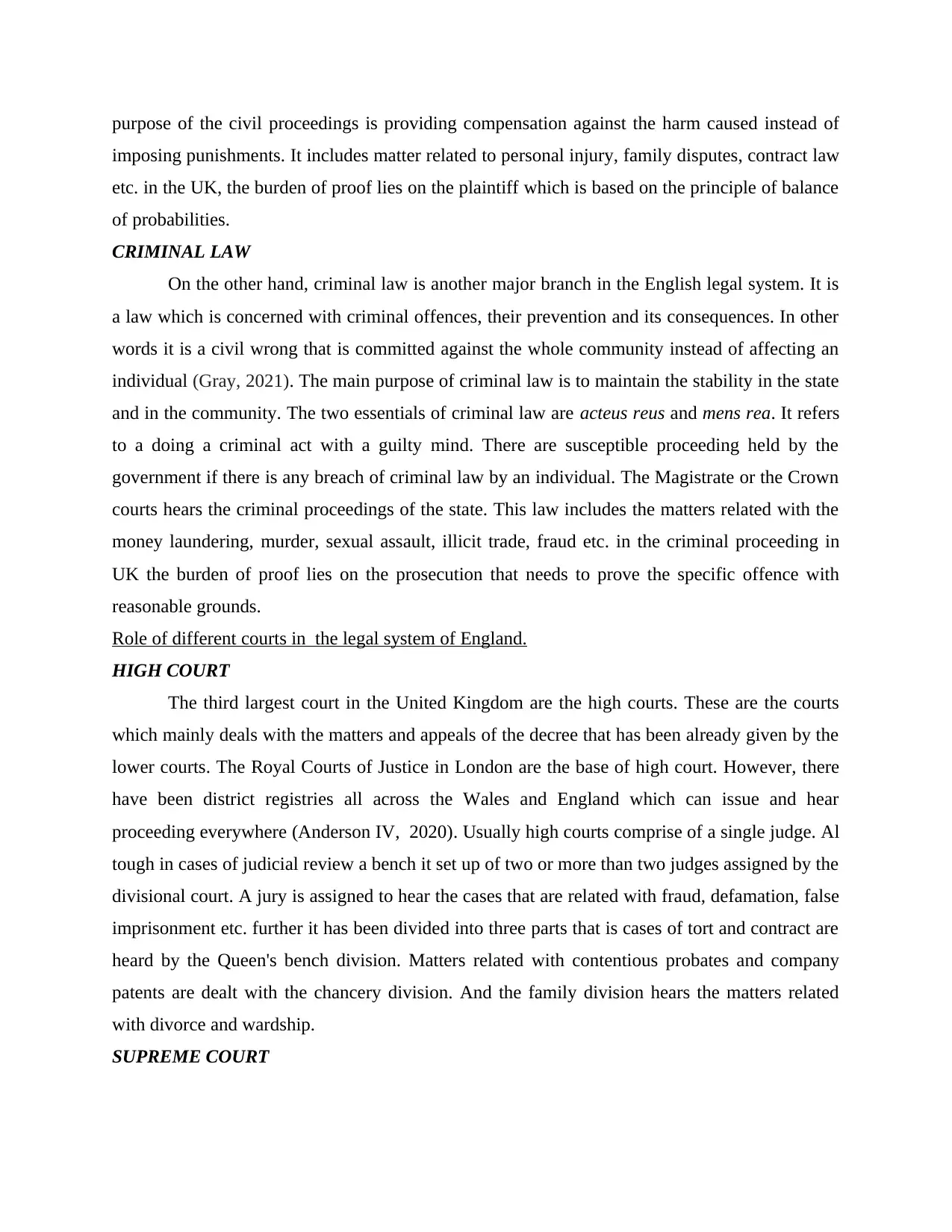
purpose of the civil proceedings is providing compensation against the harm caused instead of
imposing punishments. It includes matter related to personal injury, family disputes, contract law
etc. in the UK, the burden of proof lies on the plaintiff which is based on the principle of balance
of probabilities.
CRIMINAL LAW
On the other hand, criminal law is another major branch in the English legal system. It is
a law which is concerned with criminal offences, their prevention and its consequences. In other
words it is a civil wrong that is committed against the whole community instead of affecting an
individual (Gray, 2021). The main purpose of criminal law is to maintain the stability in the state
and in the community. The two essentials of criminal law are acteus reus and mens rea. It refers
to a doing a criminal act with a guilty mind. There are susceptible proceeding held by the
government if there is any breach of criminal law by an individual. The Magistrate or the Crown
courts hears the criminal proceedings of the state. This law includes the matters related with the
money laundering, murder, sexual assault, illicit trade, fraud etc. in the criminal proceeding in
UK the burden of proof lies on the prosecution that needs to prove the specific offence with
reasonable grounds.
Role of different courts in the legal system of England.
HIGH COURT
The third largest court in the United Kingdom are the high courts. These are the courts
which mainly deals with the matters and appeals of the decree that has been already given by the
lower courts. The Royal Courts of Justice in London are the base of high court. However, there
have been district registries all across the Wales and England which can issue and hear
proceeding everywhere (Anderson IV, 2020). Usually high courts comprise of a single judge. Al
tough in cases of judicial review a bench it set up of two or more than two judges assigned by the
divisional court. A jury is assigned to hear the cases that are related with fraud, defamation, false
imprisonment etc. further it has been divided into three parts that is cases of tort and contract are
heard by the Queen's bench division. Matters related with contentious probates and company
patents are dealt with the chancery division. And the family division hears the matters related
with divorce and wardship.
SUPREME COURT
imposing punishments. It includes matter related to personal injury, family disputes, contract law
etc. in the UK, the burden of proof lies on the plaintiff which is based on the principle of balance
of probabilities.
CRIMINAL LAW
On the other hand, criminal law is another major branch in the English legal system. It is
a law which is concerned with criminal offences, their prevention and its consequences. In other
words it is a civil wrong that is committed against the whole community instead of affecting an
individual (Gray, 2021). The main purpose of criminal law is to maintain the stability in the state
and in the community. The two essentials of criminal law are acteus reus and mens rea. It refers
to a doing a criminal act with a guilty mind. There are susceptible proceeding held by the
government if there is any breach of criminal law by an individual. The Magistrate or the Crown
courts hears the criminal proceedings of the state. This law includes the matters related with the
money laundering, murder, sexual assault, illicit trade, fraud etc. in the criminal proceeding in
UK the burden of proof lies on the prosecution that needs to prove the specific offence with
reasonable grounds.
Role of different courts in the legal system of England.
HIGH COURT
The third largest court in the United Kingdom are the high courts. These are the courts
which mainly deals with the matters and appeals of the decree that has been already given by the
lower courts. The Royal Courts of Justice in London are the base of high court. However, there
have been district registries all across the Wales and England which can issue and hear
proceeding everywhere (Anderson IV, 2020). Usually high courts comprise of a single judge. Al
tough in cases of judicial review a bench it set up of two or more than two judges assigned by the
divisional court. A jury is assigned to hear the cases that are related with fraud, defamation, false
imprisonment etc. further it has been divided into three parts that is cases of tort and contract are
heard by the Queen's bench division. Matters related with contentious probates and company
patents are dealt with the chancery division. And the family division hears the matters related
with divorce and wardship.
SUPREME COURT
Secure Best Marks with AI Grader
Need help grading? Try our AI Grader for instant feedback on your assignments.
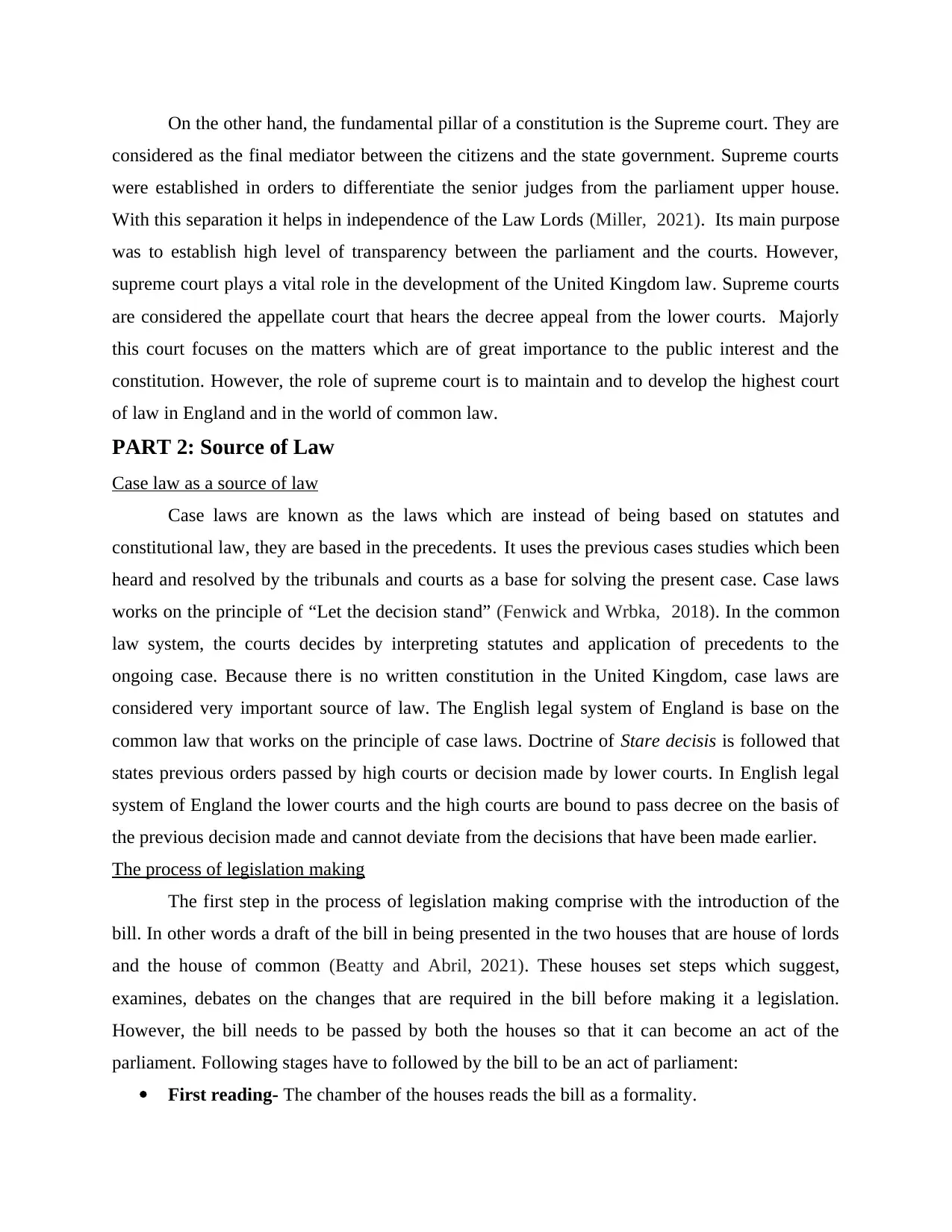
On the other hand, the fundamental pillar of a constitution is the Supreme court. They are
considered as the final mediator between the citizens and the state government. Supreme courts
were established in orders to differentiate the senior judges from the parliament upper house.
With this separation it helps in independence of the Law Lords (Miller, 2021). Its main purpose
was to establish high level of transparency between the parliament and the courts. However,
supreme court plays a vital role in the development of the United Kingdom law. Supreme courts
are considered the appellate court that hears the decree appeal from the lower courts. Majorly
this court focuses on the matters which are of great importance to the public interest and the
constitution. However, the role of supreme court is to maintain and to develop the highest court
of law in England and in the world of common law.
PART 2: Source of Law
Case law as a source of law
Case laws are known as the laws which are instead of being based on statutes and
constitutional law, they are based in the precedents. It uses the previous cases studies which been
heard and resolved by the tribunals and courts as a base for solving the present case. Case laws
works on the principle of “Let the decision stand” (Fenwick and Wrbka, 2018). In the common
law system, the courts decides by interpreting statutes and application of precedents to the
ongoing case. Because there is no written constitution in the United Kingdom, case laws are
considered very important source of law. The English legal system of England is base on the
common law that works on the principle of case laws. Doctrine of Stare decisis is followed that
states previous orders passed by high courts or decision made by lower courts. In English legal
system of England the lower courts and the high courts are bound to pass decree on the basis of
the previous decision made and cannot deviate from the decisions that have been made earlier.
The process of legislation making
The first step in the process of legislation making comprise with the introduction of the
bill. In other words a draft of the bill in being presented in the two houses that are house of lords
and the house of common (Beatty and Abril, 2021). These houses set steps which suggest,
examines, debates on the changes that are required in the bill before making it a legislation.
However, the bill needs to be passed by both the houses so that it can become an act of the
parliament. Following stages have to followed by the bill to be an act of parliament:
First reading- The chamber of the houses reads the bill as a formality.
considered as the final mediator between the citizens and the state government. Supreme courts
were established in orders to differentiate the senior judges from the parliament upper house.
With this separation it helps in independence of the Law Lords (Miller, 2021). Its main purpose
was to establish high level of transparency between the parliament and the courts. However,
supreme court plays a vital role in the development of the United Kingdom law. Supreme courts
are considered the appellate court that hears the decree appeal from the lower courts. Majorly
this court focuses on the matters which are of great importance to the public interest and the
constitution. However, the role of supreme court is to maintain and to develop the highest court
of law in England and in the world of common law.
PART 2: Source of Law
Case law as a source of law
Case laws are known as the laws which are instead of being based on statutes and
constitutional law, they are based in the precedents. It uses the previous cases studies which been
heard and resolved by the tribunals and courts as a base for solving the present case. Case laws
works on the principle of “Let the decision stand” (Fenwick and Wrbka, 2018). In the common
law system, the courts decides by interpreting statutes and application of precedents to the
ongoing case. Because there is no written constitution in the United Kingdom, case laws are
considered very important source of law. The English legal system of England is base on the
common law that works on the principle of case laws. Doctrine of Stare decisis is followed that
states previous orders passed by high courts or decision made by lower courts. In English legal
system of England the lower courts and the high courts are bound to pass decree on the basis of
the previous decision made and cannot deviate from the decisions that have been made earlier.
The process of legislation making
The first step in the process of legislation making comprise with the introduction of the
bill. In other words a draft of the bill in being presented in the two houses that are house of lords
and the house of common (Beatty and Abril, 2021). These houses set steps which suggest,
examines, debates on the changes that are required in the bill before making it a legislation.
However, the bill needs to be passed by both the houses so that it can become an act of the
parliament. Following stages have to followed by the bill to be an act of parliament:
First reading- The chamber of the houses reads the bill as a formality.
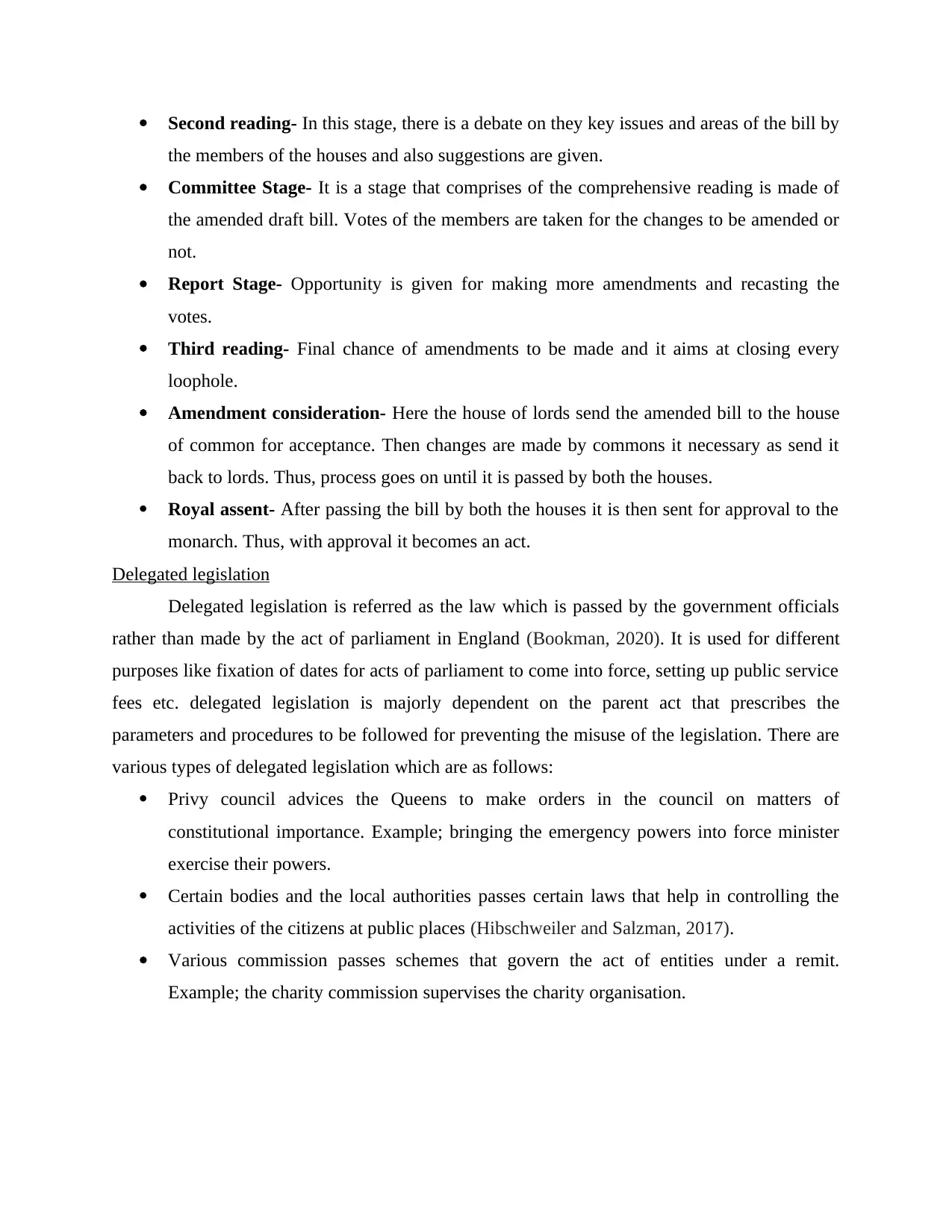
Second reading- In this stage, there is a debate on they key issues and areas of the bill by
the members of the houses and also suggestions are given.
Committee Stage- It is a stage that comprises of the comprehensive reading is made of
the amended draft bill. Votes of the members are taken for the changes to be amended or
not.
Report Stage- Opportunity is given for making more amendments and recasting the
votes.
Third reading- Final chance of amendments to be made and it aims at closing every
loophole.
Amendment consideration- Here the house of lords send the amended bill to the house
of common for acceptance. Then changes are made by commons it necessary as send it
back to lords. Thus, process goes on until it is passed by both the houses.
Royal assent- After passing the bill by both the houses it is then sent for approval to the
monarch. Thus, with approval it becomes an act.
Delegated legislation
Delegated legislation is referred as the law which is passed by the government officials
rather than made by the act of parliament in England (Bookman, 2020). It is used for different
purposes like fixation of dates for acts of parliament to come into force, setting up public service
fees etc. delegated legislation is majorly dependent on the parent act that prescribes the
parameters and procedures to be followed for preventing the misuse of the legislation. There are
various types of delegated legislation which are as follows:
Privy council advices the Queens to make orders in the council on matters of
constitutional importance. Example; bringing the emergency powers into force minister
exercise their powers.
Certain bodies and the local authorities passes certain laws that help in controlling the
activities of the citizens at public places (Hibschweiler and Salzman, 2017).
Various commission passes schemes that govern the act of entities under a remit.
Example; the charity commission supervises the charity organisation.
the members of the houses and also suggestions are given.
Committee Stage- It is a stage that comprises of the comprehensive reading is made of
the amended draft bill. Votes of the members are taken for the changes to be amended or
not.
Report Stage- Opportunity is given for making more amendments and recasting the
votes.
Third reading- Final chance of amendments to be made and it aims at closing every
loophole.
Amendment consideration- Here the house of lords send the amended bill to the house
of common for acceptance. Then changes are made by commons it necessary as send it
back to lords. Thus, process goes on until it is passed by both the houses.
Royal assent- After passing the bill by both the houses it is then sent for approval to the
monarch. Thus, with approval it becomes an act.
Delegated legislation
Delegated legislation is referred as the law which is passed by the government officials
rather than made by the act of parliament in England (Bookman, 2020). It is used for different
purposes like fixation of dates for acts of parliament to come into force, setting up public service
fees etc. delegated legislation is majorly dependent on the parent act that prescribes the
parameters and procedures to be followed for preventing the misuse of the legislation. There are
various types of delegated legislation which are as follows:
Privy council advices the Queens to make orders in the council on matters of
constitutional importance. Example; bringing the emergency powers into force minister
exercise their powers.
Certain bodies and the local authorities passes certain laws that help in controlling the
activities of the citizens at public places (Hibschweiler and Salzman, 2017).
Various commission passes schemes that govern the act of entities under a remit.
Example; the charity commission supervises the charity organisation.
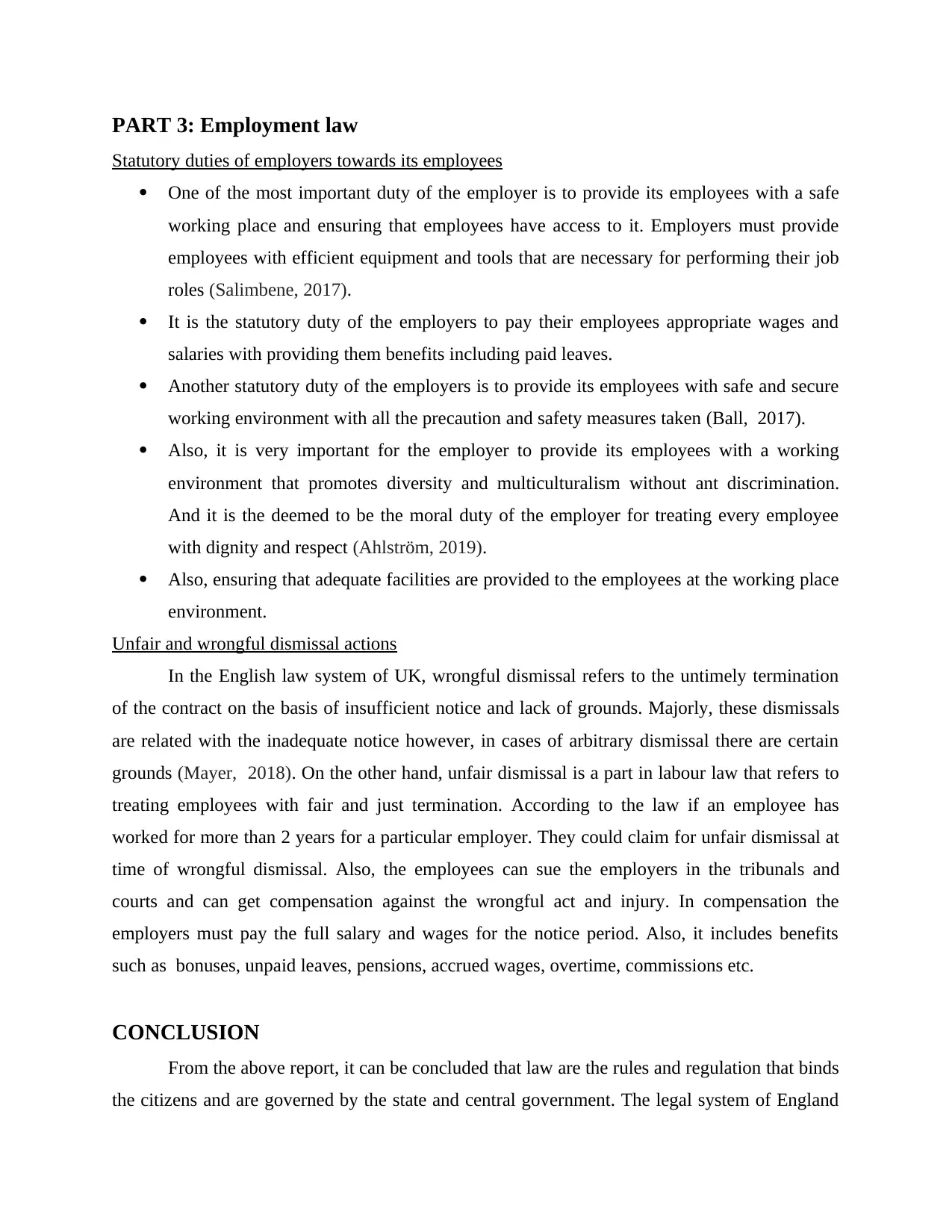
PART 3: Employment law
Statutory duties of employers towards its employees
One of the most important duty of the employer is to provide its employees with a safe
working place and ensuring that employees have access to it. Employers must provide
employees with efficient equipment and tools that are necessary for performing their job
roles (Salimbene, 2017).
It is the statutory duty of the employers to pay their employees appropriate wages and
salaries with providing them benefits including paid leaves.
Another statutory duty of the employers is to provide its employees with safe and secure
working environment with all the precaution and safety measures taken (Ball, 2017).
Also, it is very important for the employer to provide its employees with a working
environment that promotes diversity and multiculturalism without ant discrimination.
And it is the deemed to be the moral duty of the employer for treating every employee
with dignity and respect (Ahlström, 2019).
Also, ensuring that adequate facilities are provided to the employees at the working place
environment.
Unfair and wrongful dismissal actions
In the English law system of UK, wrongful dismissal refers to the untimely termination
of the contract on the basis of insufficient notice and lack of grounds. Majorly, these dismissals
are related with the inadequate notice however, in cases of arbitrary dismissal there are certain
grounds (Mayer, 2018). On the other hand, unfair dismissal is a part in labour law that refers to
treating employees with fair and just termination. According to the law if an employee has
worked for more than 2 years for a particular employer. They could claim for unfair dismissal at
time of wrongful dismissal. Also, the employees can sue the employers in the tribunals and
courts and can get compensation against the wrongful act and injury. In compensation the
employers must pay the full salary and wages for the notice period. Also, it includes benefits
such as bonuses, unpaid leaves, pensions, accrued wages, overtime, commissions etc.
CONCLUSION
From the above report, it can be concluded that law are the rules and regulation that binds
the citizens and are governed by the state and central government. The legal system of England
Statutory duties of employers towards its employees
One of the most important duty of the employer is to provide its employees with a safe
working place and ensuring that employees have access to it. Employers must provide
employees with efficient equipment and tools that are necessary for performing their job
roles (Salimbene, 2017).
It is the statutory duty of the employers to pay their employees appropriate wages and
salaries with providing them benefits including paid leaves.
Another statutory duty of the employers is to provide its employees with safe and secure
working environment with all the precaution and safety measures taken (Ball, 2017).
Also, it is very important for the employer to provide its employees with a working
environment that promotes diversity and multiculturalism without ant discrimination.
And it is the deemed to be the moral duty of the employer for treating every employee
with dignity and respect (Ahlström, 2019).
Also, ensuring that adequate facilities are provided to the employees at the working place
environment.
Unfair and wrongful dismissal actions
In the English law system of UK, wrongful dismissal refers to the untimely termination
of the contract on the basis of insufficient notice and lack of grounds. Majorly, these dismissals
are related with the inadequate notice however, in cases of arbitrary dismissal there are certain
grounds (Mayer, 2018). On the other hand, unfair dismissal is a part in labour law that refers to
treating employees with fair and just termination. According to the law if an employee has
worked for more than 2 years for a particular employer. They could claim for unfair dismissal at
time of wrongful dismissal. Also, the employees can sue the employers in the tribunals and
courts and can get compensation against the wrongful act and injury. In compensation the
employers must pay the full salary and wages for the notice period. Also, it includes benefits
such as bonuses, unpaid leaves, pensions, accrued wages, overtime, commissions etc.
CONCLUSION
From the above report, it can be concluded that law are the rules and regulation that binds
the citizens and are governed by the state and central government. The legal system of England
Paraphrase This Document
Need a fresh take? Get an instant paraphrase of this document with our AI Paraphraser

is based on the principle of common law which is further divide into three parts. Furthermore, it
can be summarized that the English system is divided into two parts the civil and the criminal
law. However, there are different roles of different courts in the legal system of UK. These
courts are governed by the case law as their source of law. At last, it can be concluded that to
become an act of the parliament the bill has to be passed by both the houses of the parliament.
can be summarized that the English system is divided into two parts the civil and the criminal
law. However, there are different roles of different courts in the legal system of UK. These
courts are governed by the case law as their source of law. At last, it can be concluded that to
become an act of the parliament the bill has to be passed by both the houses of the parliament.
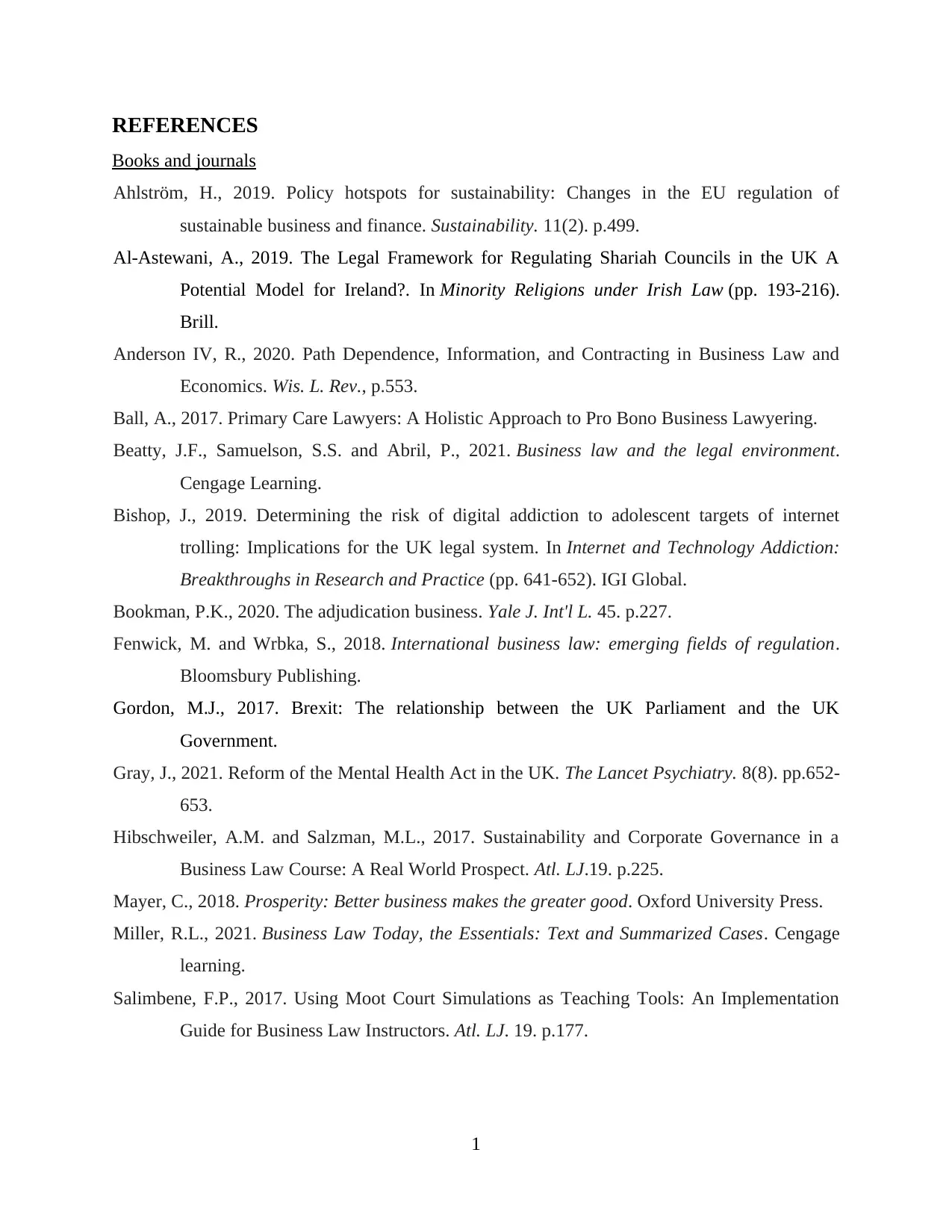
REFERENCES
Books and journals
Ahlström, H., 2019. Policy hotspots for sustainability: Changes in the EU regulation of
sustainable business and finance. Sustainability. 11(2). p.499.
Al-Astewani, A., 2019. The Legal Framework for Regulating Shariah Councils in the UK A
Potential Model for Ireland?. In Minority Religions under Irish Law (pp. 193-216).
Brill.
Anderson IV, R., 2020. Path Dependence, Information, and Contracting in Business Law and
Economics. Wis. L. Rev., p.553.
Ball, A., 2017. Primary Care Lawyers: A Holistic Approach to Pro Bono Business Lawyering.
Beatty, J.F., Samuelson, S.S. and Abril, P., 2021. Business law and the legal environment.
Cengage Learning.
Bishop, J., 2019. Determining the risk of digital addiction to adolescent targets of internet
trolling: Implications for the UK legal system. In Internet and Technology Addiction:
Breakthroughs in Research and Practice (pp. 641-652). IGI Global.
Bookman, P.K., 2020. The adjudication business. Yale J. Int'l L. 45. p.227.
Fenwick, M. and Wrbka, S., 2018. International business law: emerging fields of regulation.
Bloomsbury Publishing.
Gordon, M.J., 2017. Brexit: The relationship between the UK Parliament and the UK
Government.
Gray, J., 2021. Reform of the Mental Health Act in the UK. The Lancet Psychiatry. 8(8). pp.652-
653.
Hibschweiler, A.M. and Salzman, M.L., 2017. Sustainability and Corporate Governance in a
Business Law Course: A Real World Prospect. Atl. LJ.19. p.225.
Mayer, C., 2018. Prosperity: Better business makes the greater good. Oxford University Press.
Miller, R.L., 2021. Business Law Today, the Essentials: Text and Summarized Cases. Cengage
learning.
Salimbene, F.P., 2017. Using Moot Court Simulations as Teaching Tools: An Implementation
Guide for Business Law Instructors. Atl. LJ. 19. p.177.
1
Books and journals
Ahlström, H., 2019. Policy hotspots for sustainability: Changes in the EU regulation of
sustainable business and finance. Sustainability. 11(2). p.499.
Al-Astewani, A., 2019. The Legal Framework for Regulating Shariah Councils in the UK A
Potential Model for Ireland?. In Minority Religions under Irish Law (pp. 193-216).
Brill.
Anderson IV, R., 2020. Path Dependence, Information, and Contracting in Business Law and
Economics. Wis. L. Rev., p.553.
Ball, A., 2017. Primary Care Lawyers: A Holistic Approach to Pro Bono Business Lawyering.
Beatty, J.F., Samuelson, S.S. and Abril, P., 2021. Business law and the legal environment.
Cengage Learning.
Bishop, J., 2019. Determining the risk of digital addiction to adolescent targets of internet
trolling: Implications for the UK legal system. In Internet and Technology Addiction:
Breakthroughs in Research and Practice (pp. 641-652). IGI Global.
Bookman, P.K., 2020. The adjudication business. Yale J. Int'l L. 45. p.227.
Fenwick, M. and Wrbka, S., 2018. International business law: emerging fields of regulation.
Bloomsbury Publishing.
Gordon, M.J., 2017. Brexit: The relationship between the UK Parliament and the UK
Government.
Gray, J., 2021. Reform of the Mental Health Act in the UK. The Lancet Psychiatry. 8(8). pp.652-
653.
Hibschweiler, A.M. and Salzman, M.L., 2017. Sustainability and Corporate Governance in a
Business Law Course: A Real World Prospect. Atl. LJ.19. p.225.
Mayer, C., 2018. Prosperity: Better business makes the greater good. Oxford University Press.
Miller, R.L., 2021. Business Law Today, the Essentials: Text and Summarized Cases. Cengage
learning.
Salimbene, F.P., 2017. Using Moot Court Simulations as Teaching Tools: An Implementation
Guide for Business Law Instructors. Atl. LJ. 19. p.177.
1

2
1 out of 10
Related Documents
Your All-in-One AI-Powered Toolkit for Academic Success.
+13062052269
info@desklib.com
Available 24*7 on WhatsApp / Email
![[object Object]](/_next/static/media/star-bottom.7253800d.svg)
Unlock your academic potential
© 2024 | Zucol Services PVT LTD | All rights reserved.




